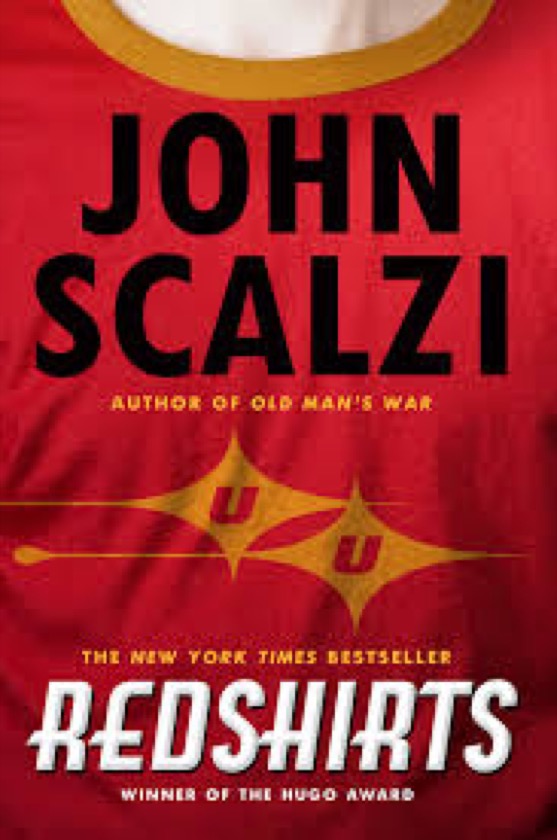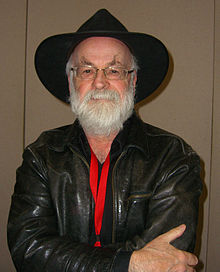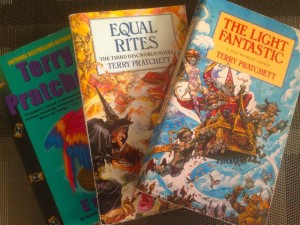
I bought some Calvin Klein Intense Power underwear and put them on one morning. I smiled when I admired them in a mirror. I would have the power of a superhero. Continue reading
Category Archives: Science Fiction
Cary Grant, meet C-3PO: Darth by Darthwest
Great science-fiction films: Ex Machina
Great science fiction and fantasy authors: Terry Pratchett
Terry Pratchett is the best-selling fantasy author many people have never heard of. By the time he died in 2015, he had sold over 85 million books (based mostly on his Discworld series), and until JK Rowling rolled around, he was the best-selling author in Britain. Including his last book, The Shepherd’s Crown, he published over 41 Discworld books. Not to mention dozens of others in different genres and subgenres.
So who was this guy?
First, he wrote fantasy books. With a comic twist.
Now before some of you start groaning, these fantasy characters aren’t like anything you’ve ever read. First of all, they’re funny. There are dwarfs six feet high, vampires who’ve taken a pledge not to drink blood, and a witch who hates riding brooms.
Secondly, they have real depth. They come alive. They have idiosyncrasies and flaws, but what makes them so endearing is that we can see ourselves in them. They’re us. Granted, they’re us if we lived on a flat world supported by four elephants standing on an enormous tortoise that soars through the cosmos.
And they’re likable, including Death, which became one of his most beloved characters.
Are you still with me?
It’s not just the characters that draw fans to his series. In each novel, he managed to slip in some wry social commentary, allowing us to see our world reflected in his.
In Thud!, he draws attention to racial prejudices, taking aim at those who fan the flames of hatred against particular groups. In Equal Rites, he makes a case for equal opportunities for women way back in 1978. And in Small Gods, he has something to say about the misuse of religion for political (or personal) gains.
Besides everything mentioned above, few authors could mix science and fantasy with such flair. Of course on Discworld, science became magic. Tiny ants build sugar pyramids to their dead queen under the flagstones of the Unseen University. Magic causes light to slow down and take its time crossing Discworld, sometimes piling up at the foot of mountain ranges. Tantric sex magic books have to be stored under cold water to keep them from bursting into flames and “scorching their severely plain covers.” And of course, few can coin a phrase like him. In the bad parts of town in Ankh-Morpork, he has “ladies of negotiable affection” working the street.
These are not just silly, harmless fantasy romps. They make us think. And wonder. And laugh. All at the same time.
That’s an amazing legacy to leave behind.
(Postscript: The author himself, in his biographic-essay collection A Slip of the Keyboard suggests beginning Discworld readers not start with his first two books, The Color of Magic and The Light Fantastic. True, as time went on, Mr. Pratchett’s writing became more masterful and in some cases, darker, but his first two entries are awfully darn good. If you want to start a bit later in his series, I suggest Hogfather and Mort.)
The Long Journey for The Martian
 The Martian by Andy Weir is a great story.
The Martian by Andy Weir is a great story.
I haven’t read it, however.
I’m sure the plot is thrilling, but what fascinates me is the other story here: how the book became a book. Then a movie.
It goes pretty much like this:
The author, Andy Weir, wrote the science fiction novel about an astronaut stranded on Mars, waiting for a rescue that will take four years. It’s all about survival.
He originally posted the book, chapter by chapter on his no-frills website. His loyal followers were clamoring for somewhere on the Internet where they could download the whole thing in Kindle for free.
It turned out, there was such a place: Amazon e-books for self-published authors. It’s called Kindle Direct Publishing. But it wasn’t free. Amazon, required authors to charge a minimum of 99 cents, with Amazon getting 64 pennies per book, and him receiving 35.
He posted the book on Amazon for 99¢ and a miracle happened. Sales started slowly, but they soon climbed. Then took off. Within seven months, over 35,000 copies had been downloaded, even though the book was still available for free on his website (which required a little technical know-how to download it).
Throughout all this, he tried to get a literary agent, but no one would touch his novel. He approached publishers, too. No one was interested. He tried for three years.
A publisher, seeing the success of the book online, approached him and asked if he had an agent. When he said no, they suggested one. A short time later, he signed with agent David Fugate. Within four days, he was approached by a movie studio who wanted to option it. The movie premiered in October 2015, with Matt Damon starring and Ridley Scott as director. The rest is history.
Andy Weir writes full time, now.
He wasn’t the first author to take this self-published path to success. Author Hugh Howey did the same with his science fiction Wool series. Fifty Shades of Grey author E. L. James started on her own. Beatrix Potter self-published, too, with her Peter Rabbit books way back in 1901.
The moral of the story here isn’t that literary agents and publishers often can’t see a gold mine when it’s staring them right in the face. Or that the traditional path to getting a book in front of readers has being overturned.
It’s that these authors had an unshakeable belief in the tale they wanted to tell.
For me, that’s the real story.
Someone’s Going to Die and It Sure As Hell Isn’t Going to Be Me
 Being a science-fiction comedy author, I decided to read John Scalzi’s Redshirts. It’s a thinly veiled parody of the original Star Trek television series, told from the viewpoint of the lesser members on the starship Intrepid. The plot centers on the character of ensign Andrew Dahl, who uncovers a sinister reality: senior members of landing parties always survive extraterrestrial encounters while ship members of lower rank—wearing signature red shirts—die terrible deaths.
Being a science-fiction comedy author, I decided to read John Scalzi’s Redshirts. It’s a thinly veiled parody of the original Star Trek television series, told from the viewpoint of the lesser members on the starship Intrepid. The plot centers on the character of ensign Andrew Dahl, who uncovers a sinister reality: senior members of landing parties always survive extraterrestrial encounters while ship members of lower rank—wearing signature red shirts—die terrible deaths.
They’re disposable.
The story is about Dahl’s attempt to change the course of fate. It’s a comedy poking fun at the science-fiction conventions of the TV series.
I’m not going to get into reviewing Scalzi’s book. There are plenty of reviews online…go read some of those. My opinion isn’t all that important. Either you’ll either love it or not. Me, I enjoyed it.
But it was my reaction to the book that surprised me the most. A reaction that arose when I started watching the original episodes of Star Trek on Netflix. I hadn’t seen them in decades.
I got angry. And the more I watched, the angrier I became. As each episode enfolded, I got angrier about the callous, arrogant way Kirk, Spock and Dr. McCoy paraded around, smug in the knowledge that they would always survive. They had become assholes. Meanwhile, the innocent, underdog redshirts would be zapped, strangled, gassed, crushed, speared and incinerated, then tossed away after a poignant but short speech made by Captain Kirk.
It was like I was seven years old and someone had told me there was no Santa Claus. I sat there stunned. Here was a TV series that I had grown to love as a child, watching it with my dad in one of the few bonding rituals I had with him. And now, the series had turned on me. Deceived me. Tricked me. There was more going on than I had ever suspected.
I’m pretty sure this wasn’t the reaction John Scalzi wanted in his readers when he wrote this book. It was probably just great fun, showing things from a different viewpoint. I’m a comedic writer…I should know better.
But I can’t help it. I still haven’t forgiven my parents for lying to me about the fat, jolly man who supposedly lived at the North Pole.
The lie was fun while it lasted, though.
Send Your Photos on an Acid Trip

 If you’re into fantasy literature and science fiction like I am, this site is the perfect place to send your photos. You upload your photos and they’re sent through a Google Deep Dream AI filter and your processed photo comes out looking like this. Trippy, huh? Because of the popularity of the original processing site, I’ve added this alternative site which processes instantly. Just upload, choose one of 16 different filters and boom, you have a fantasy landscape, pet picture or portrait. Dreamscape Happy tripping.
If you’re into fantasy literature and science fiction like I am, this site is the perfect place to send your photos. You upload your photos and they’re sent through a Google Deep Dream AI filter and your processed photo comes out looking like this. Trippy, huh? Because of the popularity of the original processing site, I’ve added this alternative site which processes instantly. Just upload, choose one of 16 different filters and boom, you have a fantasy landscape, pet picture or portrait. Dreamscape Happy tripping.
Someone at Netflix Has a Geeky Sense of Humor
 I was watching a Star Trek episode and noticed this tiny little joke inserted by an episode caption writer at Netflix. In case this makes no sense to you, you can read an entire humorous book about it by science-fiction writer John Scalzi, entitled Redshirts John Scalzi. Those in the know, will know.
I was watching a Star Trek episode and noticed this tiny little joke inserted by an episode caption writer at Netflix. In case this makes no sense to you, you can read an entire humorous book about it by science-fiction writer John Scalzi, entitled Redshirts John Scalzi. Those in the know, will know.


